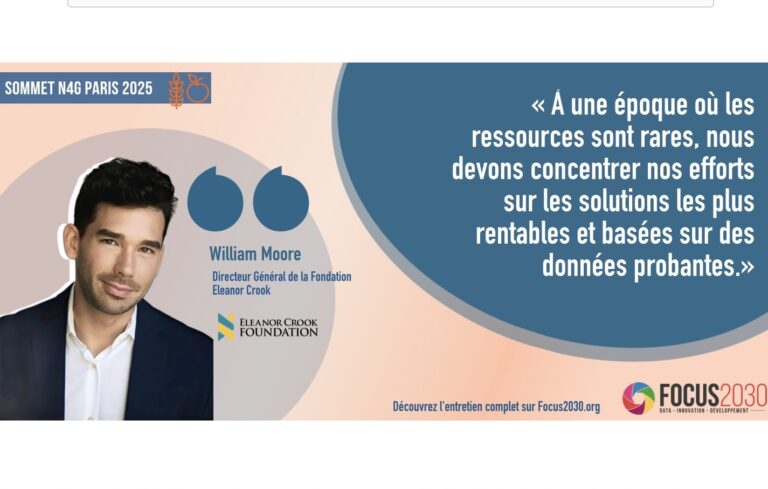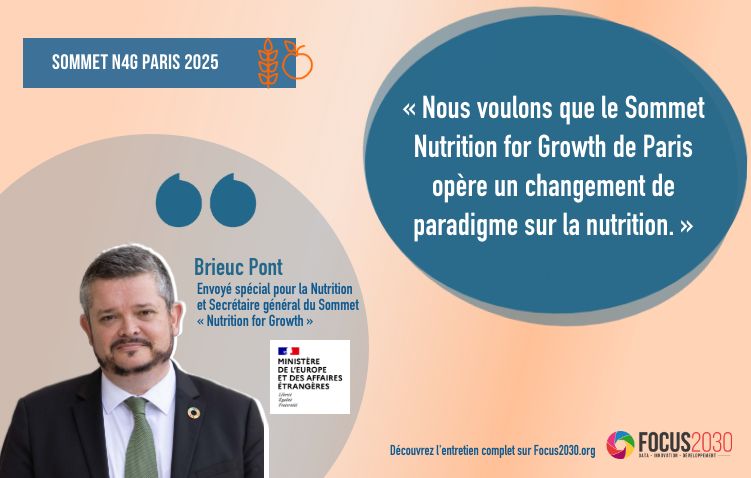3 questions to Afshan Khan, Assistant Secretary-General of the United Nations and Coordinator of the Scaling Up Nutrition (SUN) Movement
Publié le 24/01/2025.
| The next edition of the Nutrition for Growth Summit, organized by France on March 27 and 28, 2025 in Paris, represents a unique opportunity to engage the international community in a more effective fight against malnutrition. Ahead of this international summit, Focus 2030 is dedicating a special edition to the global challenges of (mal)nutrition, highlighting the views and expectations of organizations, personalities and experts working in the field of nutrition. |
3 questions to Afshan Khan, Assistant Secretary-General of the United Nations and Coordinator of the Scaling Up Nutrition (SUN) Movement
Focus 2030 : Today, three billion people still cannot afford to eat properly, and nearly one in three children under five worldwide suffers from malnutrition. What is the SUN Movement’s vision for addressing malnutrition on a global scale? What are the Movement’s top priorities and strategies to tackle all forms of malnutrition and ensure lasting and sustainable solutions?
Afshan Khan : Good nutrition is the foundation for a better future, driving progress in health, education and economic growth while empowering women, and breaking cycles of poverty and inequality. It boosts productivity and prosperity at both individual and global levels. However, the reverse is also true—malnutrition, including overweight and obesity, significantly hampers potential.
By addressing malnutrition in all of its forms, and its underlying drivers, societies are better equipped to cope with the risks of climate change and disasters, and the erosion of human capital that comes as a consequence of unhealthy diets.
The SUN Movement envisions a world where everyone, especially the most vulnerable, has access to the nutrition needed to thrive today and in the future. This requires addressing evolving global nutrition trends while ensuring the availability of evidence, capacity, and financing to respond effectively. Central to this response are the voices from the Global South—women, children, and youth—who, when empowered, become powerful agents of nutritional transformation.
To achieve this, the SUN Movement unites governments, partners, and communities across sectors and political levels, positioning nutrition as both a key marker and maker of development. It aligns country needs and priorities with global resources, supporting demand-driven initiatives. SUN supports countries in securing financing, enhancing information systems, and amplifying advocacy efforts. It works to elevate nutrition on global and national agendas, advocating for evidence-based gender-transformative actions, youth agency, and solutions tailored to humanitarian contexts. Lastly, SUN is dedicated to advancing proven nutrition solutions, such as first 1,000-day interventions to address stunting, promoting exclusive breastfeeding and bundling nutrition services with immunization, counseling, and screening is important in fragile states where services are weak.
Focus 2030 : The SUN Movement brings together 66 countries across Latin America, Asia, and Africa, all committed to improving their food systems and nutrition outcomes. It also unites four SUN Networks – Civil Society, Business, UN Nutrition and Donors. With its unique position on the international stage, how is the SUN movement driving change in the lead up of the 2025 N4G Summit and mobilizing diverse stakeholders to rally around this crucial event?
Afshan Khan : The world is approaching an important moment and opportunity to address nutrition. Building on the success of the 2021 N4G Tokyo Summit, which secured over $27 billion through 396 commitments from 181 stakeholders—including 57 SUN countries—the 2025 Summit aims to sustain this momentum with SUN countries leading the charge.
The SUN Movement is uniquely positioned to drive nutrition action leading up to N4G. Its diverse membership—spanning countries, civil society, donors, and the private sector—provides a significant advantage in mobilizing resources from a wide range of stakeholders.
As a convening platform, SUN bridges local needs with the evolving global context, facilitating the exchange of learning and best practices while amplifying local voices on the national and international stage.
SUN is supporting countries to prepare for the Summit. We have helped develop N4G thematic guides which lay out helpful criteria on commitment making in the different sectors, and supported countries to review and refine past commitments. SUN helps countries develop actionable commitments while aligning national priorities with global goals, such as the WHA targets and SDGs—demonstrating our role in connecting local and global contexts. To support this, we are concluding a series of regional workshops ahead of the N4G Summit, focusing on best practices for accountability and creating SMART (Specific, Measurable, Achievable, Relevant, Time-bound) commitments. Equally important is ensuring that these commitments are inclusive, transparent, and backed by diverse stakeholders, including governments, civil society, the private sector, and community voices.
The N4G commitment process isn’t solely about securing new financing for nutrition. Often, greater impact can be achieved by integrating nutrition into investments across other sectors, such as health or climate. This approach is especially critical given the growing threat of climate change, which is expected to worsen nutrition outcomes—stunting alone is projected to increase by 62% in South Asia.
So as SUN we are helping countries prepare for the nutrition actions needed now, and helping build awareness and understanding at all levels on how to ‘future-proof’ against the growing risks of climate and disaster, and the loss of productivity associated with that.
Focus 2030 : In 2021, the N4G Tokyo Summit unlocked a staggering $27 billion from 181 stakeholders across 78 countries, 57 of them SUN countries. Building on that momentum, what are the SUN Movement’s key expectations for the upcoming N4G Summit in Paris, and under which conditions does the SUN Movement envision the Summit contributing to tangible progress in global nutrition efforts and ensuring lasting commitments to fight malnutrition?
Afshan Khan : The SUN Movement envisions the 2025 N4G Summit in Paris as a pivotal moment to galvanize global action against malnutrition, but its success hinges on several key conditions.
First and foremost, the Summit requires bold political and financial commitments from governments, philanthropies, civil society, investors, and businesses – preferably working together for greater impact. These commitments must go beyond words, to actions that are accountable and tracked for progress.
Second, an analysis of the risks and opportunities in the global system now suggests more focus is needed on integrating nutrition into policies and budgets on other issues, such as health, gender, food systems and climate which allows countries to achieve multiple, often interdependent objectives, while making the most of scarce resources.
Third, the success of N4G lies not only in the event itself but in its ability to catalyze a sustained global campaign for nutrition. Integrating nutrition into broader agendas will amplify the N4G message across key global milestones in 2025, such as the renewal of the World Health Assembly nutrition targets, the Food Systems Summit, the SUN Global Gathering, and COP30.
Fourth, to future-proof nutrition and ensure impact, the Summit must prioritize investments that empower youth as change agents and champion gender equality. In addition, data and research should guide evidence-based policy decisions, ensuring that interventions are effective, sustainable, and inclusive – and that the evidence helps us understand how malnutrition is changing, and how we need to respond to the challenge. For example, today’s youth will be part of a world in 2050 where half of all adults are projected to be overweight or obese.
If these conditions are met, the 2025 N4G Summit has the potential to deliver tangible progress in global nutrition efforts, building momentum towards a healthier, more equitable, and sustainable future – with a focus and response to the shifting risks and trends.
NB : The opinions expressed in this interview do not necessarily reflect the positions of Focus 2030.








